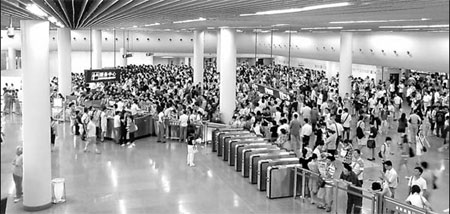Thousands of commuters were left stranded after a power failure on one of Shanghai's busiest subway lines yesterday.
The breakdown came as the metro system is being expanded to prepare for the massive crowds expected during the Shanghai World Expo next year.
At about 8:13 am, during the busy morning rush hour, a power failure shut down metro Line 2 in Pudong, according to a statement from Shanghai Shentong Metro Group.
 |
|
Thousands of commuters are stranded yesterday after a power failure on metro Line 2 in Pudong at about 8:13 am. [China Daily] |
The power resumed in about 20 minutes, but the train was soon forced to stop due to a problem caused by the power cut, according to Yin Wei, with the metro company.
The problem was solved at 9:03 am but many passengers had to wait another 40 minutes to board a train.
Huge crowds were evident at each of the 17 stations. Thousands of travelers were stranded, especially in the Dongchang, Lujiazui and Century Avenue stations in Pudong, according to Yin.
The Shanghai metro system, with eight lines stretching a total of 250 km, sees 4.42 million passengers every day.
"For Line 1 and 2, it is 1 million a day," Yin said.
Before the opening of Shanghai World Expo, the metro system will be expanded to more than 400 km.
"Both the construction and the operation are under huge pressure," Yin said.
Because of the delay, many commuters were calling their offices and homes. As a result, some of the mobile phone carriers' service failed too. At Longyang Road station, people were queuing in front of a pay phone.
At metrofans.com.cn, a netizen named williams596 said he was trapped at Century Avenue station.
"People were yelling, screaming and cursing. It was like we were sinking on the Titanic."
Another netizen named feitianshenzhu said he was trapped in a fully packed train at People's Square station. "When we finally got out of the train, everyone looked like they just had a sauna."
Most of the commuters were late for work for at least one hour. Service centers at every station gave commuters apology letters and refunds for their tickets.
The trains all have emergency batteries to provide basic lighting, broadcast and ventilation, Yin said.
Even in the event of a power failure, the metro system should be safe, he said. The company is still investigating the reason for the power failure.
Beijing's metro system, the second longest on the mainland, has also encountered frequent malfunctions in the past few months.
From March to June, at least four failures have occurred on both old and new lines, causing passengers to be stranded in a train in a dark tunnel or delayed for hours due to idle trains.
From 2003 to 2008, Beijing has poured 3.7 billion yuan to replace aging facilities and trains on the 30-year-old Line 1 and Line 2, but only managed to renovate seven systems closely related to subway operation, according to media reports.
The renovation on all subway systems will not be completed until next year. Meanwhile, the newly opened metro lines are ironing out glitches that are normal as their operations are streamlined, insiders said.
Jia Peng, spokesman for Beijing Subway, said if a power failure happens in the Beijing subway system, stranded passengers should not force open the doors or break windows to enter the tunnel, as there is a risk of electric shock.
The subway company has emergency plans that will guide passengers to safety, he said.
(China Daily July 16, 2009)